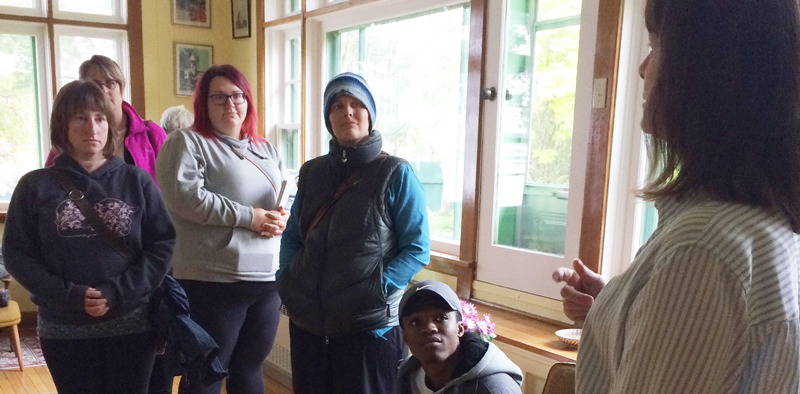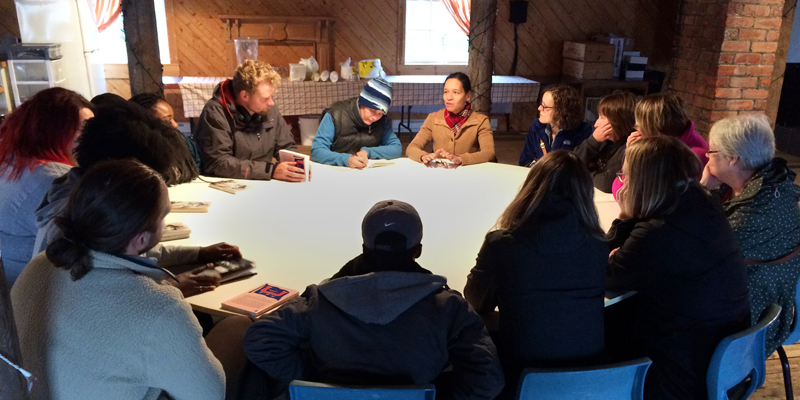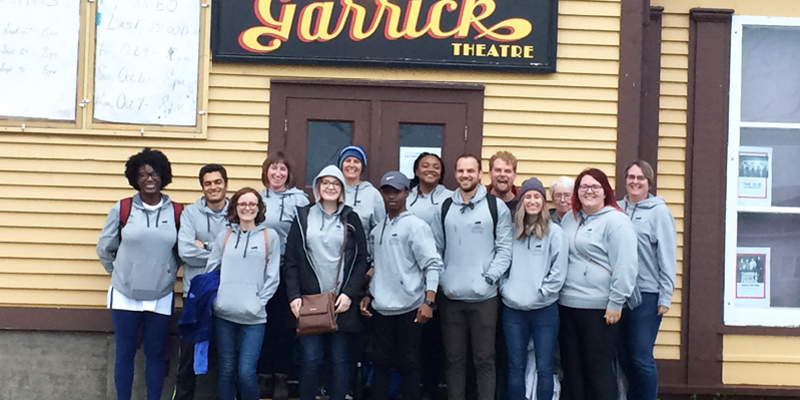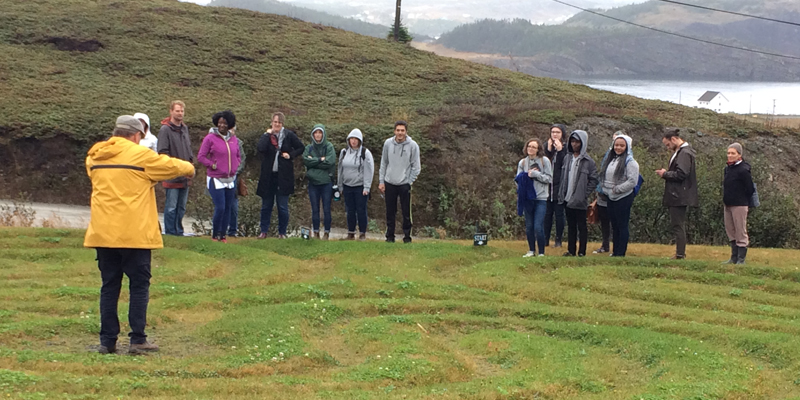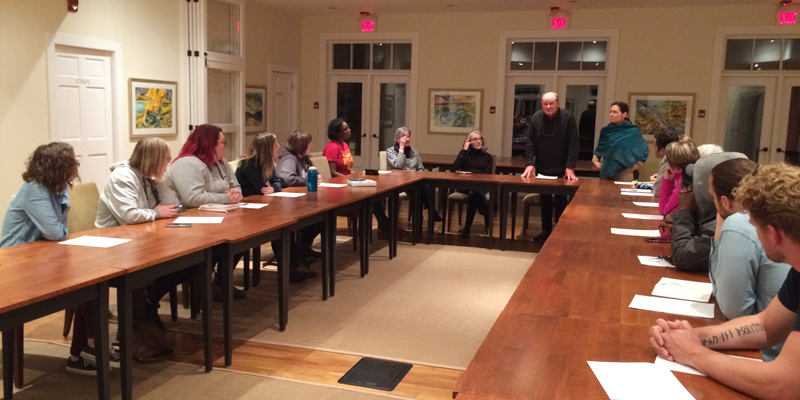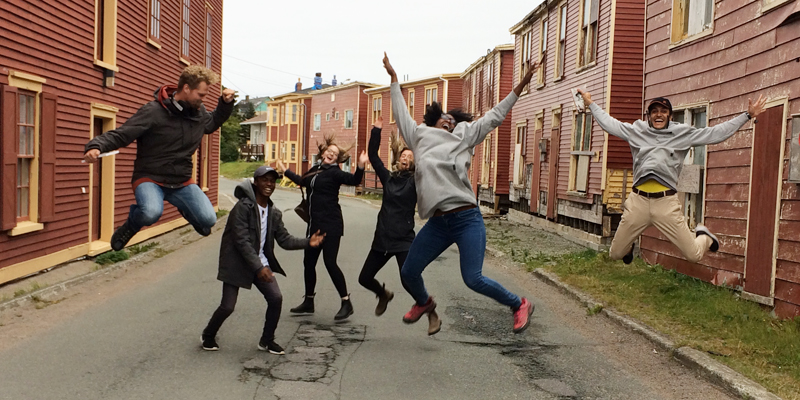Innovative business education through social enterprise and living labs
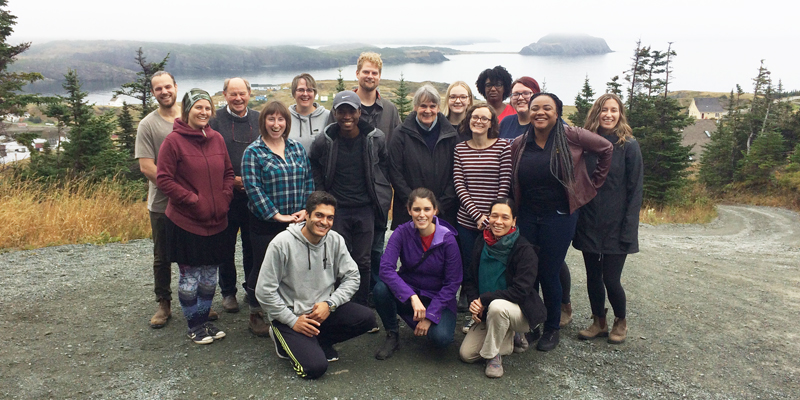
Experiential learning is shown to be highly effective in enhancing learning and knowledge, ensuring a high level of understanding and retention. Students in the MBA in Social Enterprise and Entrepreneurship (MBA-SEE) learn about theory and principles of the sector in action through the experiential “Living Lab” opportunities provided to them during the program. In September 2019, MBA-SEE students participated in a three day trip to the rural community of Port Rexton and the Bonavista Bay peninsula.
On day one, students first experienced the historic town of Port Union, the only union-built town in North America. There they learned of Sir William Coaker, a social entrepreneur and innovator from the early 20th century who led a social change movement countering a system of exploitation in the fisheries that meant fishermen were continuously in debt to the local merchant class. Coaker built a town and host of enterprises including: fishing, ship building, retail, newspaper to mention a few. They visited Coaker’s home where they learned about his life and his work, bringing about the Fisherman’s Protective Union which completely revolutionized the fishing industry, away from the merchant system and empowered communities of fishermen.
|
|
| Students listening to presenter Gail while standing in the sun room of Coaker's home |
| After the Bungalow, students walked to the Factory, where they saw the printing press from Coaker’s Fisherman’s Advocate newspaper, and many of the original tools and machinery that would have been used at the various businesses Coaker initiated. One of which was the Union Light and Electric Company which eventually merged into Newfoundland Light and Power Co. Limited, the largest provider of electric power in the province. While at the Coaker Factory, students participated in a roundtable debrief discussion with Prof. Nicole Helwig. The group reflected on having visited the two venues (bungalow and factory) and whether the work of Sir William Coaker fit the model of social entrepreneurship and social innovation that had been discussed in classes leading up to the trip. This roundtable debriefing had students considering the historical roots of social entrepreneurship in Newfoundland and how the model fits a rural context. |
|
|
| Students debrief with Prof. Nicole Helwig at the Coaker Factory Museum |
| The day wound down with a delicious meal at The Bonavista Social Club and concluded with a conversation with John and Peggy Fisher in the Conference Centre at Fishers’ Loft Inn. There was great discussion about social business, ethics, and prosperity! Students demonstrated engagement, critical thinking and interest in the unique heritage of Newfoundland and it’s social enterprise landscape. The morning of the second day was spent in Port Rexton. There, students walked to Port Rexton Brewery where a panel discussion was held outside on the deck, despite the misty weather. It added to the discussion around the importance of a place-based approach to economic development! The guest speakers for this discussion included: Sonja Mills from the Port Rexton Brewery, John Fisher from Fishers Loft Inn and Two Whales Café owners David Ellis and Sue Asquith. Students talked about all of them being outsiders moving to Port Rexton and setting up their businesses. This included how they are involved in community engagement/development, and how they see their businesses as being social enterprises, or socially-minded enterprises. Students had the opportunity to ask questions and chat with all of the business owners. |
|
|
| MBA-SEE students outside the Garrick Theatre, owned and operated by the Bonavista Historic Townscape Foundation and one of the oldest surviving theatres in Newfoundland |
| Next students visited Bonavista where, in the pouring rain, they did a “hop on hop off” tour of the town with David Bradley of the Bonavista Historic Townscape Foundation (BHTF). David showed students some of the sites that the BHTF had worked on restoring, talked about the history of Bonavista and the development of the community since the 1992 cod moratorium. It was interesting to learn about how BHTF has worked on developing the infrastructure of the community (sidewalks, greenspaces, facades of public buildings and historic properties) to make it more livable, and to bring in businesses and services that will make Bonavista a place where people can live and enjoy year round and not just as a summer destination. The panel discussion in Bonavista was hosted at the Garrick Theatre, and had four guest speakers: David Bradley, John Norman (Mayor and owner of Bonavista Living, Bonavista Creative and Bonavista Creative Workshop), Paula Roberts (Department of Tourism, Culture, Industry and Innovation, TCII) and Marilyn Coles-Hayley (Home from the Sea foundation, Town of Elliston, Roots Rants and Roars festival). The students enjoyed hearing more about the development of Bonavista; and Elliston’s efforts to drive economic development, including a restaurant, the designation as “root cellar capital of the world” and the festival. Students also learned more about the Government’s involvement in these activities from Paula’s perspective in the Department of TCII. |
|
|
| John Fisher of Fishers’ Loft leading the students on a tour of their premises, Port Rexton |
| After the panel discussion, students headed to the Boreal Diner on Church Street where they shared a delicious meal and had casual conversation. It was interesting and exciting to note that the students are keen to talk about their observations, interests and experiences with social enterprise, related policies and issues, even when not in class! On Friday a small group hiked part of the Skerwink Trail and then headed to the town of Clarenville. There students had lunch at the new Bare Mountain Coffee House, owned by Nancy Robbins who works with Atlantic Canada Opportunities Agency. Nancy spoke to the students about the process of starting up a coffee shop and explained how she and her husband saw a gap in Clarenville’s community spaces. There was no hub where people could get together for a good cup of coffee, fresh food and to hang out! Bare Mountain uses fresh local produce and baked goods, and serves Trinity Mercantile drip coffee as well as Bonavista Coffee. They support the arts and other community groups by hosting events and selling locally made artwork and products direct from the store. |
|
|
| Conversation with John and Peggy Fisher, Fishers’ Loft Conference Centre |
| During lunch at Bare Mountain, our students made posters in support of the Climate Strike, which we then used to decorate our bus for the drive home! All in all, the trip was eye-opening for our MBA-SEE class. This has given them great perspective on Newfoundland history, culture and rural economic & community development! |
|
|
| Students demonstrating enthusiasm in Port Union |
